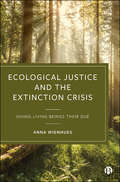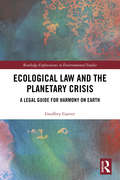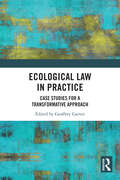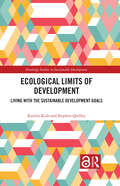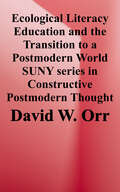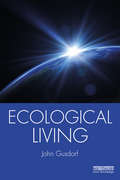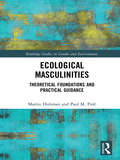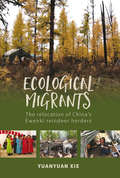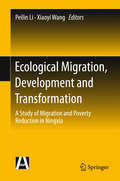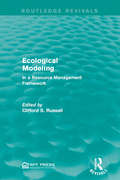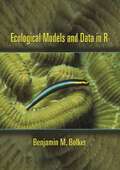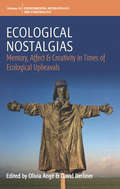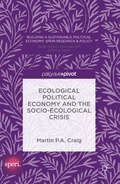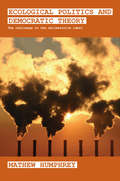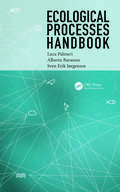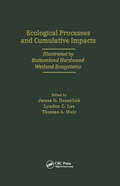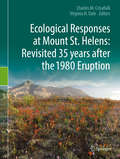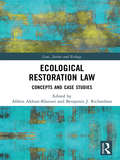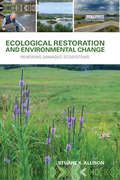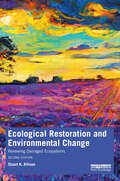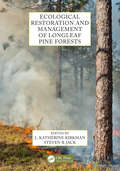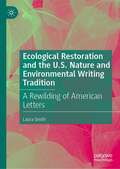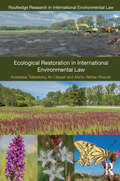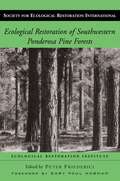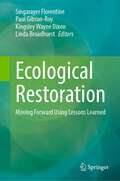- Table View
- List View
Ecological Justice and the Extinction Crisis: Giving Living Beings their Due
by Anna WienhuesAs the biodiversity crisis deepens, Anna Wienhues sets out radical environmental thinking and action to respond to the threat of mass species extinction. The book conceptualises large-scale injustice endangering non-humans, and signposts new approaches to the conservation of a shared planet. Developing principles of distributive ecological justice, it builds towards a bold vision of just conservation that can inform the work of policy makers and activists. This is a timely, original and compelling investigation into ethics in the natural world during the Anthropocene, and a call for biocentric ecological justice before it is too late.
Ecological Law and the Planetary Crisis: A Legal Guide for Harmony on Earth (Routledge Explorations in Environmental Studies)
by Geoffrey GarverThis book uses a transdisciplinary systems approach to examine how Earth’s human-caused ecological crisis arose and presents a new legal approach for overcoming it. Ecological Law and the Planetary Crisis first examines how the history of humanity’s social metabolism, along with the history of human inventions and ideas, led to the human-Earth dilemma we see today and explains why contemporary law is inadequate for confronting this dilemma. The book goes on to propose ecological law—law that maintains human activity within ecological limits such as planetary boundaries while ensuring social justice and equity—as an essential element of an urgently needed radical pathway of change toward a perpetual, mutually enhancing human-Earth relationship. Finally, it offers a systems-based analytical tool for organizing actions to promote the transition from environmental to ecological law. Increasing the visibility, clarity and development of ecological law, this book will be of great interest to students and scholars of ecological and environmental law and governance.
Ecological Law in Practice: Case Studies for a Transformative Approach
by Edited by Geoffrey GarverThis book presents a series of "ecological law" case studies, designed to illustrate in concrete, real-world ways how ecological law would transform law in a range of diverse contexts.Ecological law is an emerging, and currently mostly theoretical, discipline grounded in the need to shift away from anthropocentric legal systems, which aim to promote economic growth using strong protections of private property regimes and state sovereignty, to ecological approaches, which emphasize ecocentrism, the primacy of ecological limits, and intragenerational, intergenerational, and interspecies fairness and justice. The ecological law case studies presented in this book apply the theoretical principles and concepts of ecological law to diverse real-world situations or activities in several countries and contexts. Taking up a range of examples from Brazil, Canada, Germany, Mexico, Nigeria, the United States, and internationally, the book demonstrates the concrete relevance of ecological law to contemporary sustainability challenges, as it reveals pathways for overcoming real-world challenges in the implementation and public acceptance of ecological law.This book will appeal to researchers, scholars, and policy makers working in the area of environmental law and governance, as well as others with relevant interests in sociolegal studies, human geography, political science, and environmental studies.
Ecological Limits of Development: Living with the Sustainable Development Goals (Routledge Studies in Sustainable Development)
by Stephen Quilley Kaitlin KishEmbracing the reality of biophysical limits to growth, this volume uses the technical tools from ecological economics to recast the Sustainable Development Goals (SDGs) as Ecological Livelihood Goals – policy agendas and trajectories that seek to reconcile the social and spatial mobility and liberty of individuals, with both material security and ecological integrity. Since the 1970s, mainstream approaches to sustainable development have sought to reconcile ecological constraints with modernization through much vaunted and seldom demonstrated strategies of ‘decoupling’ and ‘dematerialization’. In this context, the UN SDGs have become the orchestrating drivers of sustainability governance. However, biophysical limits are not so easily sidestepped. Building on an ecological- economic critique of mainstream economics and a historical- sociological understanding of state formation, this book explores the implications of ecological limits for modern progressive politics. Each chapter outlines leverage points for municipal engagement in local and regional contexts. Systems theory and community development perspectives are used to explore under- appreciated avenues for the kind of social and cultural change that would be necessary for any accommodation between modernity and ecological limits. Drawing on ideas from H.T. Odum, Herman Daly, Zigmunt Bauman, and many others, this book provides guiding research for a convergence between North and South that is bottom-up, household-centred, and predicated on a re- emerging domain of Livelihood. In each chapter, the authors provide recommendations for reconfiguring the UN’s SDGs as Ecological Livelihood Goals – a framework for sustainable development in an era of limits. This book will be of great interest to students and scholars of ecological economics, socio- ecological systems, political economy, international and community development, global governance, and sustainable development.
Ecological Literacy: Education and the Transition to a Postmodern World (SUNY Series in Constructive Postmodern Thought Ser.)
by David W. OrrThe most important discoveries of the 20th century exist not in the realm of science, medicine, or technology, but rather in the dawning awareness of the earth's limits and how those limits will affect human evolution. Humanity has reached a crossroad where various ecological catastrophes meet what some call sustainable development. While a great deal of attention has been given to what governments, corporations, utilities, international agencies, and private citizens can do to help in the transition to sustainability, little thought has been given to what schools, colleges, and universities can do. <p><p>Ecological Literacy asks how the discovery of finiteness affects the content and substance of education. Given the limits of the earth, what should people know and how should they learn it?
Ecological Living
by John GusdorfThis book emphasizes how we already have the technologies available, including renewable energy and the ability to recycle most materials, to make ecological living possible and that perceived barriers to energy transitions can be overcome. Human life relies upon two systems: the biosphere and the system that produces our goods and services. Today, these two systems are in conflict, and we all face the question of whether we can stop damaging our environment while still supplying the essential goods and services we have come to depend on. Ecological Living presents an optimistic vision of our future by showing how decoupling the productive system from resource extraction is possible, and how this is a key means of achieving an equitable world within environmental limits. For long-term sustainability, the book argues that we must become more efficient in the use of our resources so that resource extraction, and the accompanying environmental costs, can be reduced. Demonstrating the essential steps towards a just and sustainable world, Ecological Living will be of great interest to all students, academics, and policymakers working in the field of environment and sustainability.
Ecological Masculinities: Theoretical Foundations and Practical Guidance (Routledge Studies in Gender and Environments)
by Martin Hultman Paul M. PuléAround the globe, unfettered industrialisation has marched forth in unison with massive social inequities. Making matters worse, anthropogenic pressures on Earth’s living systems are causing alarming rates of thermal expansion, sea-level rise, biodiversity losses in terrestrial and aquatic ecosystems and a sixth mass extinction. As various disciplines have shown, rich white men in the Global North are the main (although not the only) perpetrators of this slow violence. This book demonstrates that industrial/breadwinner masculinities have come at terrible costs to the living planet and ecomodern masculinities have failed us as well, men included. This book is dedicated to a third and relationally focused pathway that the authors call ecological masculinities. Here, they explore ways that masculinities can advocate and embody broader, deeper and wider care for the global through to local (‘glocal’) commons. Ecological Masculinities works with the wisdoms of four main streams of influence that have come before us. They are: masculinities politics, deep ecology, ecological feminism and feminist care theory. The authors work with profeminist approaches to the conceptualisations and embodiments of modern Western masculinities. From there, they introduce masculinities that give ADAM-n for Earth, others and self, striving to create a more just and ecologically viable planet for all of life. This book is interdisciplinary. It is intended to reach (but is not restricted to) scholars exploring history, gender studies, material feminism, feminist care theory, ecological feminism, deep ecology, social ecology, environmental humanities, social sustainability, science and technology studies and philosophy.
Ecological Migrants: The Relocation of China's Ewenki Reindeer Herders
by Yuanyuan XieReindeer-herding Ewenki hunters have lived in the forests of China’s Greater Khingan Range for over three hundred years. They have sustained their livelihoods by collecting plants and herbs, hunting animals and herding reindeer. This ethnography details changing Ewenki ways of life brought first by China’s modernization and development policies and more recently by ecological policies that aim to preserve and restore the badly damaged ecologies of western China. Xie reflects on modernization and urbanization in China through this study of ecological migration policies and their effects on relocated Aoluguya Ewenki hunters.
Ecological Migration, Development and Transformation
by Peilin Li Xiaoyi WangAfter over 30 years of reform and opening up, China's aggregate economic volume is now the second largest in the world. Over the past decade many provinces in the western region of China have implemented ecological migration projects of different scales, which have attracted considerable attention both in China and abroad. The projects indicate, first, that there is an urgent need for this type of endeavor: whether the goal is to reduce poverty or to protect the environment, we need to move the poor populations out of the ecologically fragile regions. Secondly, the projects indicate that the Chinese government is capable of meeting this need. Migration projects are complex and costly and without sufficient financial resources and systematic planning, migration may fail to reduce poverty, and could even aggravate it. The rapid economic growth in China, however, makes such migration projects viable.
Ecological Modeling: In a Resource Management Framework (Routledge Revivals)
by Clifford S. RussellThis volume, originally published in 1975, grew out of Resources for the Future’s involvement as a consultant to the Marine Ecosystem Analysis programme management within the National Oceanic and Atmospheric Agency. Here, researchers look at the state of the art in aquatic ecological modelling in a resource management context. Although the aim of the research in this volume is specific, the models used can be applied in broader contexts and provide conceptual frameworks for regional residuals-environmental quality management and other ecological modelling. This title is suitable for students interested in Environmental Studies.
Ecological Models and Data in R
by Benjamin M. BolkerEcological Models and Data in R is the first truly practical introduction to modern statistical methods for ecology. In step-by-step detail, the book teaches ecology graduate students and researchers everything they need to know in order to use maximum likelihood, information-theoretic, and Bayesian techniques to analyze their own data using the programming language R. Drawing on extensive experience teaching these techniques to graduate students in ecology, Benjamin Bolker shows how to choose among and construct statistical models for data, estimate their parameters and confidence limits, and interpret the results. The book also covers statistical frameworks, the philosophy of statistical modeling, and critical mathematical functions and probability distributions. It requires no programming background--only basic calculus and statistics. Practical, beginner-friendly introduction to modern statistical techniques for ecology using the programming language R Step-by-step instructions for fitting models to messy, real-world data Balanced view of different statistical approaches Wide coverage of techniques--from simple (distribution fitting) to complex (state-space modeling) Techniques for data manipulation and graphical display Companion Web site with data and R code for all examples
Ecological Nostalgias: Memory, Affect and Creativity in Times of Ecological Upheavals (Environmental Anthropology and Ethnobiology #26)
by David Berliner Olivia AngéIntroducing the study of econostalgias through a variety of rich ethnographic cases, this volume argues that a strictly human centered approach does not account for contemporary longings triggered by ecosystem upheavals. In this time of climate change, this book explores how nostalgia for fading ecologies unfolds into the interstitial spaces between the biological, the political and the social, regret and hope, the past, the present and the future.
Ecological Political Economy and the Socio-Ecological Crisis
by Martin P. A. CraigCritically synthesising a range of disparate literatures and debates, this book asks what is at stake in mounting a decisive response to the 'socio-ecological crisis' - a crisis of humanity's relationship with the rest of nature that places social life as we know it in jeopardy. Martin Craig proposes that political economists within and beyond the field of political ecology make an indispensable contribution to the diagnosis of this crisis and the formulation of prescriptions for its resolution. In a wide-ranging yet concise exposition, he assess the fraught relationship between capitalist societies and the biosphere of which they are a part, and urges a renewed emphasis on political-economic structure and strategy when considering responses to the crisis. The result is a proposal for a critical yet inclusive research enterprise - 'ecological political economy' - within which a wide variety of researchers can readily participate.
Ecological Politics and Democratic Theory: The Challenge to the Deliberative Ideal (Extremism and Democracy)
by Mathew HumphreyThis volume examines the reasons why some despair at the prospects for an ecological form of democracy, and challenges the recent ‘deliberative turn’ in environmental political thought. Deliberative democracy has become popular for those seeking a reconciliation of these two forms of politics. Demand for equal access to a public forum in which the best argument will prevail appears to offer a way of incorporating environmental interests into the democratic process. This book argues that deliberative theory, far from being friendly to the environmental movement, shackles the ability those seeking radical change to make their voices heard in the most effective manner. Mathew Humphrey challenges beliefs about the relationship between ecological politics and democracy at a time when those who take direct action are being swept up in the War on Terror. By calling for a more open and contested form of democracy, in which the boundaries of what constitutes ‘acceptable’ behaviour are not decided in advance of actual debate, Ecological Politics and Democratic Theory is an original contribution to the literature on environmental politics, ecological thought and democracy.
Ecological Processes Handbook (Applied Ecology and Environmental Management)
by Sven Erik Jorgensen Luca Palmeri Alberto BarausseEcology is cross-disciplinary field involving many different aspects of science. Written with this in mind, this book introduces ecological processes, ranging from physical processes, to chemical processes and biological processes. It contains all the necessary information on an ecological process: a clear, detailed but not too lengthy definition,
Ecological Processes and Cumulative Impacts Illustrated by Bottomland Hardwood Wetland EcosystemsLewis Publishers, Inc.
by Coastal Ecology InstThis timely book is a "must-have" for anyone involved with wetland conservation, in particular bottomland hardwood forests, a habitat in which over 50% of our nation's inventory has been destroyed. Authored by recognized experts, the book thoroughly covers the ecological processes in bottomland hardwood forests and relates these processes to human activities. Chapters include original research into ecological processes, discuss impacts of human activities on flood plain ecosystems, and examine human perceptions of bottomland values and management strategies for ecosystem restoration and conservation. The book focuses on impact assessment and management, featuring local sites and ecosystems, as well as the processes in larger areas, such as watersheds and hydrological basins.
Ecological Responses at Mount St. Helens: Revisited 35 years after the 1980 Eruption
by Virginia H. Dale Charles M. CrisafulliThis book builds on existing work exploring succession, disturbance ecology, and the interface between geophysical and biological systems in the aftermath of the 1980 eruptions of Mount St. Helens. The eruption was dramatic both in the spatial extent of impacts and the range of volcanic disturbance types and intensities. Complex geophysical forces created unparalleled opportunities to study initial ecological responses and long-term succession processes that occur in response to a major contemporary eruption across a great diversity of ecosystems--lowland to alpine forests, meadows, lakes, streams, and rivers. These factors make Mount St. Helens an extremely rich environment for learning about the ecology of volcanic areas and, more generally, about ecosystem response to major disturbance of many types, including land management. Lessons about ecological recovery at Mount St. Helens are shaping thought about succession, disturbance ecology, ecosystem management, and landscape ecology. In the first five years after the eruption several syntheses documented the numerous, intensive studies of ecological recovery. The 2005 volume "Ecological Responses to the 1980 Eruption of Mount St. Helens" (Springer Publishing) was the first ecological synthesis since 1987 of the scores of ecological studies underway in the area. More than half of the world's published studies on plant and animal responses to volcanic eruptions have taken place at Mount St. Helens. The 25-year synthesis, which generally included investigations (i. e. , data) from 1980-2000, made it possible to more thoroughly analyze initial stages of ecological responses and to test the validity of early interpretations and the duration of early phenomena. And 35 years after the eruption, it is time for many of the scientists working in the first three-decade, post-eruption period to pass the science baton to the next generation of scientists to work at Mount St. Helens, and a synthesis at this time of transfer of responsibility to a younger cohort of scientists will be an enormous asset to the continuation of work at the volcano.
Ecological Restoration Law: Concepts and Case Studies (Law, Justice and Ecology)
by Benjamin J. Richardson Afshin Akhtar-KhavariEcological restoration is as essential as sustainable development for the health of the biosphere. Restoration, however, has been a low priority of most countries' environmental laws, which tend to focus narrowly on rehabilitation of small, discrete sites rather than the more ambitious recovery of entire ecosystems and landscapes. Through critical theoretical perspectives and topical case studies, this book's diverse contributors explore a more ambitious agenda for ecological restoration law. Not only do they investigate current laws and other governance mechanisms; they also consider the philosophical and methodological bases for the law to take ecological restoration more seriously. Through exploration of themes relating to time, space, geography, semiotics, social justice, and scientific knowledge, this book offers innovative and critical insights into ecological restoration law.
Ecological Restoration and Environmental Change: Renewing Damaged Ecosystems
by Stuart K. AllisonWhat is a natural habitat? Who can define what is natural when species and ecosystems constantly change over time, with or without human intervention? When a polluted river or degraded landscape is restored from its damaged state, what is the appropriate outcome? With climate change now threatening greater disruption to the stability of ecosystems, how should restoration ecologists respond? Ecological Restoration and Environmental Change addresses and challenges some of these issues which question the core values of the science and practice of restoration ecology. It analyzes the paradox arising from the desire to produce ecological restorations that fit within an historical ecological context, produce positive environmental benefits and also result in landscapes with social meaning. Traditionally restorationists often felt that by producing restorations that matched historic ecosystems they were following nature's plans and human agency played only a small part in restoration. But the author shows that in reality the process of restoration has always been defined by human choices. He examines the development of restoration practice, especially in North America, Europe and Australia, in order to describe different models of restoration with respect to balancing ecological benefit and cultural value. He develops ways to balance more actively these differing areas of concern while planning restorations. The book debates in detail how coming global climate change and the development of novel ecosystems will force us to ask new questions about what we mean by good ecological restoration. When the environment is constantly shifting, restoration to maintain biodiversity, local species, and ecosystem functions becomes even more challenging. It is likely that in the future ecological restoration will become a never-ending, continuously evolving process.
Ecological Restoration and Environmental Change: Renewing Damaged Ecosystems
by Stuart K. AllisonEcological Restoration and Environmental Change presents an introduction to the practice of renewing and restoring degraded, damaged, or destroyed ecosystems and habitats in the environment. The book addresses and challenges key issues which question the core values of the science and practice of restoration ecology. The author explains that the process of restoration has always been defined by human choices and examines the development of restoration practice, to describe different models of restoration with respect to balancing ecological benefit and cultural value. He develops ways to balance more actively these differing areas of concern while planning restorations. This new edition has been fully revised and updated to reflect changes in the field and the new challenges posed to restoration ecology in the face of the rapid pace of climate change. With strong coverage of North and South American, Europe, and Australia, this new edition has been expanded to also address indigenous perspectives and restoration projects in Africa, the Pacific Islands, and Asia. It places special emphasis on the need for restorationists to appreciate and understand the intricacies of planning and managing restorations in novel ecosystems. Lastly, it provides a critique of the new restoration standards published by the Society for Ecological Restoration in 2019. This book is essential reading for students on restoration ecology and conservation courses, as well as professionals and practitioners working on restoration projects.
Ecological Restoration and Management of Longleaf Pine Forests
by L. Katherine Kirkman Steven B. JackEcological Restoration and Management of Longleaf Pine Forests is a timely synthesis of the current understanding of the natural dynamics and processes in longleaf pine ecosystems. This book beautifully illustrates how incorporation of basic ecosystem knowledge and an understanding of socioeconomic realities shed new light on established paradigms and their application for restoration and management. Unique for its holistic ecological focus, rather than a more traditional silvicultural approach, the book highlights the importance of multi-faceted actions that robustly integrate forest and wildlife conservation at landscape scales, and merge ecological with socioeconomic objectives for effective conservation of the longleaf pine ecosystem.
Ecological Restoration and the U.S. Nature and Environmental Writing Tradition: A Rewilding of American Letters
by Laura SmithThis book presents a critical history of the intersections between American environmental literature and ecological restoration policy and practice. Through a storying—restorying—restoring framework, this book explores how entanglements between writers and places have produced literary interventions in restoration politics. The book considers the ways literary landscapes are politicized by writers themselves, and by conservationists, activists, policymakers, and others, in defense of U.S. public lands and the idea of wilderness. The book profiles five environmental writers and examines how their writings on nature, wildness, wilderness, conservation, preservation, and restoration have variously inspired and been translated into ecological restoration programs and campaigns by environmental organizations. The featured authors are Henry David Thoreau (1817–1862) at Walden Pond, John Muir (1838–1914) in Yosemite National Park, Aldo Leopold (1887–1948) at his family’s Wisconsin sand farm, Marjory Stoneman Douglas (1890–1998) in the Everglades, and Edward Abbey (1927–1989) in Glen Canyon. This book combines environmental history, literature, biography, philosophy, and politics in a commentary on considering (and developing) environmental literature’s place in conversations on restoration ecology, ecological restoration, and rewilding.
Ecological Restoration in International Environmental Law (Routledge Research in International Environmental Law)
by Anastasia Telesetsky Afshin Akhtar-Khavari An CliquetHuman activities are depleting ecosystems at an unprecedented rate. In spite of nature conservation efforts worldwide, many ecosystems including those critical for human well-being have been damaged or destroyed. States and citizens need a new vision of how humans can reconnect with the natural environment. With its focus on the long-term holistic recovery of ecosystems, ecological restoration has received increasing attention in the past decade from both scientists and policymakers. Research on the implications of ecological restoration for the law and law for ecological restoration has been largely overlooked. This is the first published book to examine comprehensively the relationship between international environmental law and ecological restoration. While international environmental law (IEL) has developed significantly as a discipline over the past four decades, this book enquires whether IEL can now assist states in making a strategic transition from not just protecting and maintaining the natural environment but also actively restoring it. Arguing that states have international duties to restore, this book offers reflections on the philosophical context of ecological restoration and the legal content of a duty to restore from an international law, European Union law and national law perspective. The book concludes with a discussion of several contemporary themes of interest to both lawyers and ecologists including the role of private actors, protected areas and climate change in ecological restoration.
Ecological Restoration of Southwestern Ponderosa Pine Forests (Science Practice Ecological Restoration #2)
by Gary Paul Nabhan Peter Friederici Peter Ecological Restoration InstituteEcological Restoration of Southwestern Ponderosa Pine Forests brings together practitioners and thinkers from a variety of fields--including forestry, biology, philosophy, ecology, political science, archaeology, botany, and geography--to synthesize what is known about ecological restoration in ponderosa pine forests and to consider the factors involved in developing and implementing a successful restoration effort. The book examines:* the overall context for restoration--ecological, social, economic, political, and philosophical* how ecosystem processes such as fire, hydrology, and nutrient cycling are affected by restoration activities* treatment effects on specific ecosystem components such as trees, understory plants, animals, and rare or invasive species* the details of implementing restoration projects, including smoke management, the protection of cultural resources, and monitoringEach section is introduced with a case study that demonstrates some of the promise and pitfalls of restoration projects.Ecological Restoration of Southwestern Ponderosa Pine Forests is the second book in the series The Science and Practice of Ecological Restoration from the Society for Ecological Restoration International and Island Press.
Ecological Restoration: Moving Forward Using Lessons Learned
by Singarayer Florentine Paul Gibson-Roy Kingsley Wayne Dixon Linda BroadhurstEcological restoration, although a relatively new endeavour compared to other disciplines, has gained significant momentum during the last decade as accelerating global change becomes more apparent. It is now widely accepted by the scientific community that to avoid further devastating effects of climate change and biodiversity loss, humanity must determinedly move more to protect and restore natural ecosystems. Many restoration efforts of the past have been ad hoc, site and situation-specific and have often failed to achieve desired outcomes, but over the last decade, many countries are allocating increasingly significant amounts of financial investment towards restoration with the goal of achieving more systematic and predictable outcomes. Today, activities related to restoring ecosystems, natural assets and biodiversity are a global focus. This book covers a wide range of topics related to ecological restoration including for grasslands, wetlands, temperate and tropical forests and arid zones. Importantly, it also focuses on ecological restoration in human-disturbed landscapes such as for urban areas, farmlands, mine sites and transport corridors. It highlights the necessity for evidence-based approaches that are both nuanced and complementary with prescriptions for people-based restoration, that is socially inclusive and cognisant of historic and current community sentiment. Ambitious landscape and continental scale targets for ecological restoration have been set across the globe. However, without practical guidelines developed from restoration evaluations from the recent past to follow, future efforts are unlikely to be successful, nor -expected targets met. To that end, this book reviews and highlights a large number and variety of restoration stories from around the world. Most are presented as reader-friendly case studies, that feature innovative and systematic techniques for undertaking species-rich ecological restoration. Together they provide inspiration for current and future professionals and offer unique glimpses into state-of-the-art practice for this critically important discipline
